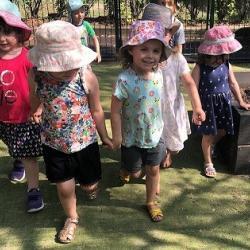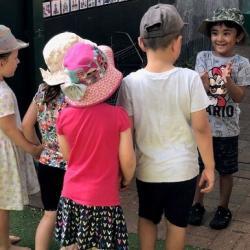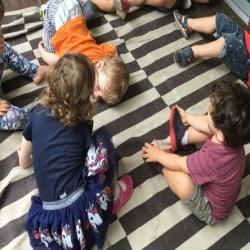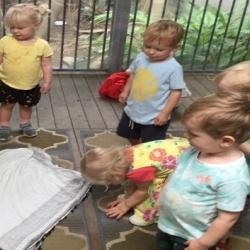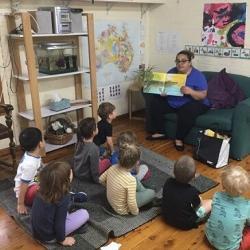Johnson House
The children in Johnson House have enjoyed playing group games this week. This has been a nice opportunity for social connections to continue to thrive and develop. ‘What’s the time Mr Wolf?’ has been a definite favourite, and the children have been empowered to lead the game and they also encouraged and supported peers who were new to the concept of this game. Games such as these enhance children’s social development and help them to develop skills in persistence, collaboration and concentration.
Murray House
Infants
Bubbles are a fantastic resource for stimulating children’s senses and encouraging them to practice their hand-eye coordination skills. Bubble play involves lots of movement as the children track individual bubbles. This week in Murray House infants, bubble play was extended by allowing the children to gather and share their play and the space. This activity also provided a calm atmosphere that supported children’s emotions, especially those who had just arrived in the morning or who were still feeling a little anxious to say goodbye to their families.
The children love playing with bubbles. They grin and chuckle as they observe, and they have been kept very busy chasing after the bubbles to grasp and pop with their fingers. Some children were eager to blow the bubbles themselves. It was a fun play and learning experience.
Toddlers
Last week in Murray House toddlers we celebrated Australia Day with a hand printing experience. Our intention was to promote a sense of belonging for all children. Inspired by Harmony Day that is held in March, the colour orange was chosen for the experience. We kept the Australia Day celebration message very simple by explaining to children that orange means ‘everyone belongs’ and that we all belong to Murray House.
As many of our children are still settling into our program we are continuing to help them to develop a strong sense of belonging to our Murray House community and helping them feel safe, secure, and supported. This learning outcome is being facilitated through many intentional music and movement experiences and many small group games such as ‘Doggy, doggy where’s your bone?’ ‘Duck duck goose’, ‘Sleeping bunnies’, and ‘Where are the children?’
Group games require children to take turns and they help them develop important social-emotional skills including self-regulation. Turns taking is a valuable skill that helps children to make friends, wait, be patient, follow rules, and develop a sense of fairness. Children need opportunities to practice turn taking, and we will continue to offer opportunities for them to revisit these games as well as introducing new ones.
Robinson House
The beginning of the year at Robinson House welcomes connections and fostering of close bonds and friendships amongst the children. The children have been engaged in listening to stories with educators and music and movement experiences, which have welcomed fun, interactive relationship building and learning.
Over the last few weeks educators and children have greeted each other eager to boogie and jive to music. The children have been singing and dancing to songs like ‘Head, Shoulders, Knees and Toes’ and learning the ‘Macarena’, which is similar to Head, Shoulders, Knees and Toes’, except there are more steps and body parts that they have to tap, and it’s faster. The educators model the actions and steps to the children by taking part in the experience. The children are always enthusiastic and focused, following each other’s leads and, most importantly, having fun.
Other groups of children have been snuggling up close with an educator, or sitting comfortably on the mat listening to some favorite stories. As the stories are read, the children begin to connect with story characters as they follow the theme and sequence of the book. Story reading encourages the children to share their thoughts and ideas. Children begin to feel that others care about them, know them well and are interested in what they do, think and feel. By developing responsive, warm, trusting and respectful relationships with children, we promote the children’s wellbeing, self-esteem and sense of security.
